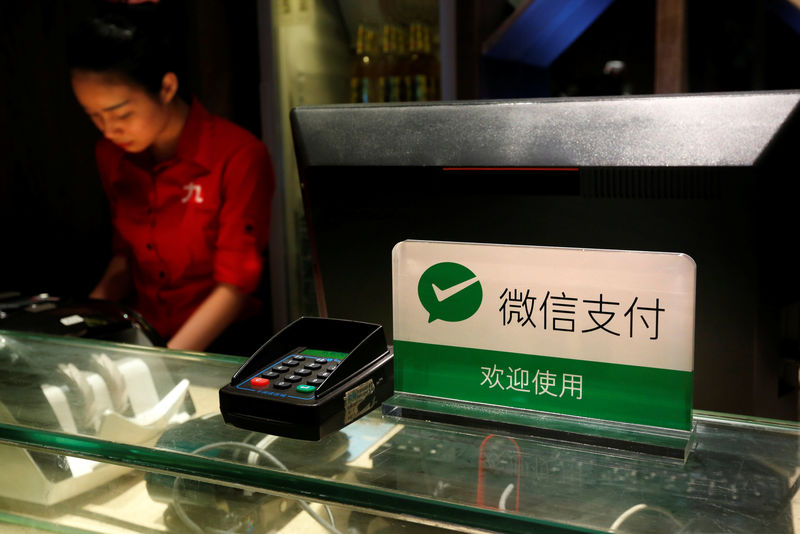By Sijia Jiang
HONG KONG (Reuters) - In a cluster of refurbished Mao-era industrial buildings in Guangzhou, developers at China's top messaging app, WeChat, are redesigning key parts of its product to spread its tentacles to just about every aspect of Chinese life.
Around 1,500 developers, mainly twentysomething males, have been tasked with increasing user engagement through new 'mini-programs' on WeChat that look and operate much like apps on Apple (NASDAQ:AAPL) Inc's iOS and Google's Android operating systems - but are far less data-intensive.
WeChat, owned by Tencent Holdings, says it's not a direct challenge to the dominant mobile platforms, but some analysts and developers say the new business could eat into that of iOS and Android app ecosystems.
(For a graphic on priority messaging click http://tmsnrt.rs/2pYVMKR)
"In the long-term, the relationship between Tencent and Apple's ecosystems will be co-existence and 'co-opetition' - intense competition in some areas and time periods, coupled with some form of cooperation in others," said Su Ning, professor of Information Systems at Ivey Business School in Canada.
With more than 938 million users, WeChat, known as Weixin in China, already serves as a one-stop-shop for everything from reading news and booking taxis to ordering takeaways and making payments. Half the users spend more than 90 minutes a day on its chat app, according to WeChat.
WeChat's push on these nimble mini-apps comes as Google (NASDAQ:GOOGL) this week launched its own Android Instant Apps, which don't require downloading and are available on certain Android devices, though access to Google products in China is heavily restricted.
WeChat says there are about 200,000 third-party developers for the WeChat platform.
"A very strong trend in China is that demand for iOS and Android apps is waning, while that for programme developing based on WeChat is rising," said Leon Du, co-founder of Guangzhou-based Beansmile, a digital consultancy that develops apps and websites.
Helped by WeChat-based advertising and payment-related services, Tencent this week reported its highest profit growth in three years for the first quarter.
While Tencent doesn't release data on the number of mini-programs available, Dong Xu, a manager at market data firm Analysys, says her interviews with businesses suggest the adoption rate has so far been modest.
"Mini-programs are mainly used for low-frequency, offline scenarios, such as fee payments, parking, and customer inquiries," Dong said. "Users' in-depth needs such as entertainment and e-commerce still take place with apps."
Third-party developers say the mini-programs, built in WeChat's proprietary programming language, are less data-heavy and easier to develop than their iOS or Android counterparts.
Users, for example, can tap a programme on a restaurant's official WeChat account to order food, have it delivered to their table and pay for it, all in one app.
WeChat also last month quietly established a new department dedicated to online searching, and this week rolled out a beta search-engine box with enhanced power, revealing its ambition to take on rival Baidu Inc (NASDAQ:BIDU).
PAY WARS
Central to its plans for an expansive and dynamic app ecosystem is the development of WeChat's own payment infrastructure.
Around 300 developers work for WeChat Pay, which competes with Alipay, run by Alibaba (NYSE:BABA) affiliate Ant Financial, and to a lesser extent, Apple Pay, which launched in China last year.
TenPay, which runs WeChat Pay and Tencent's smaller QQ Wallet, is China's most popular mobile payment provider by users, with 838 million users dwarfing Alipay's 432 million, according to Analysys.
At a post-earnings conference call on Wednesday, Tencent President Martin Lau flagged WeChat Pay's goal to permeate all aspects of consumer life in China.
For Apple, which wants to deepen its reach in China, the world's biggest mobile spender, WeChat's large and loyal fan base and its payment service present a challenge.
China overtook the United States as the biggest contributor to Apple's iOS app store revenue last year, according to mobile data analytics firm App Annie. However, Apple's Greater China revenue dropped 14 percent in the first three months of the year, as cheaper rivals chipped away at sales.
Apple declined to comment for this article.
Last month, some Chinese WeChat fans threatened to ditch Apple products after the U.S. firm forced the chat app to abolish a popular tipping function.
While building user loyalty is a core part of both Apple's and WeChat's strategies, Zhang Ying, general manager of WeChat Pay, has downplayed product tensions from the tipping spat.
"Apple is still supportive of the [WeChat] ecosystem. We are part of the [Apple] ecosystem," he told a forum in Hong Kong last month.
"It is far from a 'choose-one-or-another' - it's merely some disagreement."
